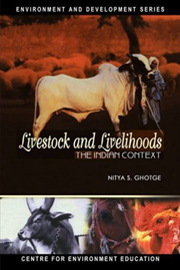Book contents
- Frontmatter
- Foreword
- Acknowledgements
- Contents
- Preface
- Chapter 1 The Beginning …
- Chapter 2 Patterns of Livestock rearing
- Chapter 3 Traditional Practices in Animal Rearing
- Chapter 4 Emerging Trends in Livestock Rearing
- Chapter 5 It must not End: Towards an Alternative Policy
- Chapter 6 Reorienting Ourselves
- Chapter 7 Framework for An Alternate Policy
- References
- Index
Foreword
Published online by Cambridge University Press: 26 October 2011
- Frontmatter
- Foreword
- Acknowledgements
- Contents
- Preface
- Chapter 1 The Beginning …
- Chapter 2 Patterns of Livestock rearing
- Chapter 3 Traditional Practices in Animal Rearing
- Chapter 4 Emerging Trends in Livestock Rearing
- Chapter 5 It must not End: Towards an Alternative Policy
- Chapter 6 Reorienting Ourselves
- Chapter 7 Framework for An Alternate Policy
- References
- Index
Summary
The Centre for Environment Education is concerned with bringing more innovative strategy to the notice of policy-makers and the general public in order to sensitize them to the need for environmentally sound decisions. The current book series has been planned as a means of providing access to alternative viewpoints, backed by analysis and information, on various policy aspects presented by development theorists and practioners from diverse fields.
The relationship between humans and other species valuable for various purposes extends beyond pure economics into the realm of compassion and cooperation, as we are here in the role of chief caretakers on the planet. Human habitation demands the use of draught animals in farming, dairy operations, milking, transport and others. The agrarian economy demands the optimum utilization of species such as the camel, goat, mithun, yak, cow, buffalo and horse to take care of and assist in many daily activities around which our well being is centered.
Caring for these animals goes beyond providing veterinary services or enlisting them in shelters when they are no longer useful to us. Even royalty in the past has made use of horses, elephants and other animals as a mark of regal splendour and the Indian tradition of cattle fairs and shadies is replete with instances of mutual benefit-sharing between our own species and these others. Buddhism and Jainism too have contributed to this tradition of kindness and compassion to animals.
- Type
- Chapter
- Information
- Livestock and LivelihoodsThe Indian Context, pp. v - viPublisher: Foundation BooksPrint publication year: 2004



